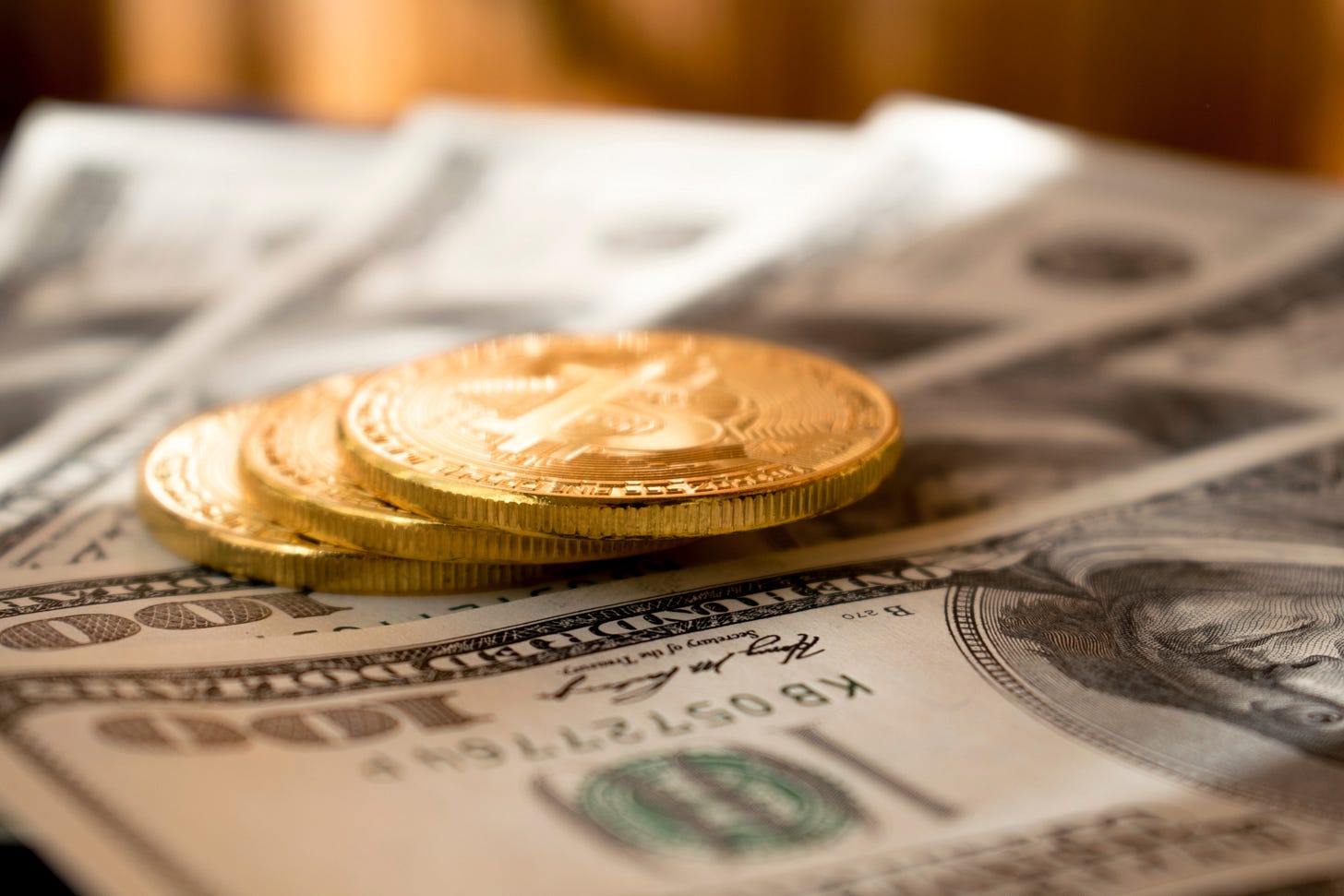
Jared Brock’s Future Faith podcast is also available for free on Spotify and Apple Podcasts.
Hello brothers and sisters,
Welcome to Future Faith, a podcast, newsletter, and publication about living faithfully in an age of democratic destruction, ecological collapse, and economic irrelevance. Future Faith is now available for free on Substack, Spotify, and Apple Podcasts. I’m your host, Jared Brock, and today we’re going to discuss the wildly corrupt world of modern money. Grab a coffee and a pen and paper, because it’s vitally important that Christians understand how money works so we can make it serve our vision and values instead of becoming enslaved by it.
This episode is sponsored by Swanbitcoin. As you’ll discover in this episode, government fiat money is wildly corrupt… but “investing” in Bitcoin is highly risky and just turns it into a pyramid scheme. Instead, we need to SPEND and GIVE crypto to achieve rapid global adoption before centralized surveillance currencies monopolize money forever. So head over to swanbitcoin.com/jaredbrock to get $10 in free Bitcoin to spend. That’s $10 in free Bitcoin at swanbitcoin.com/jaredbrock
Today’s episode is entitled Christians and Money. Are you ready? Here we go.
Sixteen of Jesus’s 38 parables involved money and wealth.
Nearly 15% of everything Jesus spoke about related to money and possessions, and the only thing he talked about more was the Kingdom of God.
There are over 2,300 Bible verses about money. By comparison, faith and prayer are mentioned about 500 times.
Clearly, the writers of the Bible knew it was important that we have a right view and understanding of money. As one pastor put it, “Our attitude toward money is an indication of where our heart is with God.”
And on an everyday level, knowing what money is and where it comes from is incredibly important, as it plays a huge role in our future wealth or poverty, as well as our time and earthly freedom.
Understanding money is so important that it will never be taught in schools.
So let’s talk about it.
What is money?
It’s a simple question, but if you ask the average person, they’ll have a hard time actually explaining what modern money is, where it comes from, and how badly it’s destroying our society and advancing the plans of the enemy.
Just as fish are rarely conscious that they’re swimming in water, we humans are rarely conscious that we live in a powerful financial stream that’s taking us places we don’t want to go.
So let’s dive in. Or rather… dive out?
What is money?
Money is simply an agreement between two or more strangers to use something as a means of payment.
If 325 million Americans agree to use a tiny green rectangle of paper backed by the full might of the US military as a means of payment, that’s money.
If 100 million mostly young adults agree to use digital bits of cryptographic code as a means of payment, that’s money.
If all my friend agree to accept IOU homebrews as a means of payment for cooking, carpentry, and car repairs, that’s money.
Money is an agreement between two or more strangers to use something as a means of payment, and it requires trust between the parties involved — ideally, by making sure the money represents some sort of enforceable underlying wealth.
The difference between wealth and money
Money and wealth aren’t the same thing.
True wealth is purely biological. You can eat it. Drink it. Wear it. Drive it. Live in it. Heat your house with it. Power your car or machine or business with it.
Money, when it’s working well, is an accurate representation of real wealth.
True wealth isn’t imaginary; it’s biological. Bankers, hedge fund managers, and NFT creators aren’t “wealth-creators” — they’re sophisticated video game players who successfully convince people to ascribe value to digital numbers, which in turn allows the creators to then acquire items of real wealth like mega-mansions, Ossetra caviar, doomsday bunkers, and hyperyachts.
So how can you figure out the difference between wealth and money?
Quite easily.
Remember, money is an agreement between two or more strangers.
So to determine if something is money or real wealth, just pretend that you’re the last person on earth or alone on a deserted island for the rest of your life.
Money in that context immediately becomes worthless. American dollars, Euros, pounds, gold, silver, Bitcoins, beaver pelts… it’s all money, and it’s all utterly useless without another person to accept it as a means of payment.
Real wealth proves itself real in isolation. If you’re the last person on earth, you’ll value water, food, and shelter far more than Mexican pesos and Chinese renminbi.
Jack Sparrow didn’t scream for $USD — he hollered for rum.
How is wealth created?
True wealth is created by applying time, effort, creativity, and sacrifice to the raw materials that God freely gives.
When a carpenter sacrifices time/effort/creativity to turn a tree into a desk, table, or bed frame, she creates wealth.
When a chef sacrifices time/effort/creativity to turn some eggs and lobster into a $1,000 omelet, he creates wealth.
When engineers sacrifice time/effort/creativity to build Elon Musk’s Tesla-building robots, they create wealth.
On the flipside…
When a landlord extracts rent from a tenant, he isn’t creating real wealth.
When a Bitboy’s crypto holdings go up in price, he isn’t creating real wealth.
When a Robinhood addict’s shorts pay off, he’s isn’t creating real wealth.
When a billionaire’s stock goes up in price, he’s isn’t creating real wealth.
But when a minimum-wage worker at one of those portfolio companies applies her time and effort to assemble two all-beef patties, special sauce, lettuce, cheese, pickles, and a sesame seed bun into a Big Mac, she’s creating a tiny bit of real wealth.
People generally value real wealth. We instinctively understand that the more sacrifice is required, the more it should be worth. That’s why machine-assembled Casio watches are five bucks apiece, while hand-made Patek Philippes can run you up to $24 million.
Wealth versus value
Wealth and value aren’t the same thing.
To someone with a full bank account and access to a reliable grocery store, a lump of gold jewelry is often more valuable than a loaf of bread. But to a person on the brink of starvation, a lump of gold is often more only valuable if it can be readily exchanged for a loaf of bread.
Value is a measure of desire.
Value can fluctuate wildly, and it is easily manipulated. We can survive without bankers and insurance brokers, but we’re dead without doctors and farmers. Yet brokers and bankers earn far more money than the latter, which suggests the value hierarchy of the elites who control our economy needs a radical recalibration. Elites clearly desire private profits over public health, so they assign more value to extractive professions like financial services.
Let’s pretend for a moment that value was democratically determined.
Even in that fairy tale scenario, not all sacrifice is the same. Bitcoin’s proof-of-work is that a specific computational effort has been expended. A house builder’s proof-of-work is the 500-unit subdivision he just finished. Both of these sacrifice-created forms of value can be sold as money, though one is clearly more valuable (from a true wealth perspective) than the other.
Price versus value
Price and value aren’t the same thing.
A house’s wealth is comprised of all the material and sacrifice that went into it.
A house’s value is determined by how useful it is to a potential purchaser.
A houses’ price is the amount of money charged for it, which is determined by value + manipulation. House prices are often boosted far beyond true value by a purposeful constriction of supply (thanks developers and land-lorders) and a purposeful glut of interest-bearing credit (thanks bankers).
Prices can become even more unfair for products when corporations have a selling monopoly (or conversely, when a single buyer has a monopsony.)
Prices can spike when powerful elites constrict supply, be it housing, Bitcoin, diamonds, gold, copper, oil — anything where people can at least temporarily corner the market.
An easy way to understand the money vs. wealth vs. value vs. price schema is to consider which piece of financing changes most:
Money is the means by which you pay for a house. (This rarely changes — most Americans use $USD.)
Wealth is the materials and sacrifice that go into building a house. (This doesn’t change. Once a house is built, it’s built.)
Value is the personal usefulness to you. (This doesn’t change. You need 365 nights of shelter each year.)
Price is what you’re forced to pay by the market. (This changes on a daily basis, suggesting that prices rarely accurately reflect real value or wealth.)
This is the problem with our current economy: Prices are rigged.
And when prices are rigged, it allows the most powerful people in society to extract real wealth from the masses. By rigging the housing market through limiting supply, boosting demand by bankrolling investors to buy up multiple properties, and offering cheap credit to all with little money down, bankers can extract vast amounts of sacrifice from others without sacrificing anything themselves.
There’s a word for this practice: injustice.
To recap
Money is negotiable.
Wealth is objective.
Value is subjective.
Price is manipulated.
How is money created?
Brace yourself.
Unlike creating real wealth, which is a measure of sacrifice, modern money is created in the exact opposite way — by extracting future sacrifice from others.
Today’s fiat currencies are created as private debt in one of two ways:
Public debt
Governments and central banks print money out of thin air (via treasury notes or bond-buying) and call it “stimulus” or “quantitative easing.”Private debt
You go to the bank and ask for a mortgage or a car loan. A banker types on a computer and creates credit in your account. Now you have to pay it back with real cash plus interest. That’s it. New money has been created. (If someone deposits $10 in a bank, the bank can loan out $9, then another bank can book that loan as an asset, which allows them to loan out eight more dollars, which allows another bank to book that loan as an asset, loan out $7, $6, $5, etc. It’s called the money-multiplier effect, and it’s the reason you have to work harder year after year. The end result? Almost all new money is created as debt.)
Welcome to the insane fractional-reserve banking system.
That’s why it’s called fiat currency. In the Latin Bible, God’s first words were “Fiat lux” — Let there be light. Governments now say, “Let there be money.”
That can’t be it, right?
Surely bankers and governments shouldn’t be able to type numbers into a screen and print money out of thin air. Wouldn’t that inflate house prices and stock prices and put the squeeze on billions of people who have to work hard to pay back fake loans (plus interest) with the real wealth of their real labor? Wouldn’t printing money make currency worth less every year until $100 trillion doesn’t buy a loaf of bread?
Yep.
And yet, 80% of all American M1 money stock in existence was printed in the past 18 months.
Modern magical money creation is so simple and insidious that it’s downright repellent to most civilized minds.
Back in the day, someone would have to show up in London with 500 sheep or 1,000 bottles of Madeira to receive a note of credit that was redeemable at a sister bank across the Atlantic in New York.
The value came first.
Now, because humans are such a wonderfully hopeful (and often delusional) species, we do it the other way around — we create new money out of thin air and hope the value chain will catch up.
It never does.
Most people can’t believe that most money is created via private debt.
Thankfully, Western governments are at least honest about the scam:
“Even though I work at the Fed, I really hadn’t thought a lot about money creation in awhile so I looked up your question and basically, yes, banks create money by what is called fractional banking. Banks take your deposit, hold a certain % in reserve, and lend out the rest, which then gets redeposited, spent, etc.” — My friend who’s worked at the U.S. Federal Reserve for 20+ years
“The majority of money in the modern economy is created by commercial banks making loans.” — Bank of England
“Private commercial banks create money when they purchase newly issued government securities by making digital accounting entries on their own balance sheets. Money is also created within the private banking system every time the banks extend a new loan, such as a home mortgage.” — Bank of Canada
How in the world did we let this happen?
Well… we, the people never had a choice:
America’s central bank, called the Federal Reserve, is actually owned by 12 regional reserve banks.
Each of these regional banks are owned by private commercial banks.
Let’s look at the most important of those 12 reserve banks, the New York Fed. A Freedom of Information Act request revealed that the biggest shareholders of the NY Fed are… wait for it… Citibank at 42.8% and JPMorgan Chase at 29.5%. Other shareholders include Morgan Stanley, Goldman Sachs, and even foreign banks like HSBC and Deutsche Bank.
So who owns the central bank and the monopoly on money-printing?
The richest people on earth.
No wonder they’re so rich. They’re the closest to the money printer.
If the GameStop crowd really wanted to have some fun, they should buy a majority stake in America’s biggest bank and expose this fraud from the inside.
The problems with modern money-printing
When corporate-captured governments print debt-based money that isn’t backed by real wealth and has to be paid back with interest, they create a tidal wave of negative consequences in our lives and the lives of the poor:
They put the squeeze on billions trying to make ends meet.
They make the masses work hard to pay back fake money loans (plus interest) with the real wealth of their real labor.
They devalue purchasing power by debasing currency. Not only does this straight-up steal money from everyone holding cash, but it discourages savings — making people less antifragile and more dependent on the state.
They detach money from real wealth and value.
They lock us into an unsustainable debt+interest death spiral that bankrupts millions of families on a regular basis and requires all of us to compete against each other.
They use their money power to set the agenda for the whole nation, spending on wars, toppling foreign governments, extracting wealth from poorer nations, sacrifice from their own citizens, stealing trillions of hours of human life.
Let’s not mince words: The secular, corporate-controlled, central banking money-printing scam is the biggest sin and crime in human history.
What about cryptocurrency?
Unfortunately, crypto does the same thing as fiat currency — it prints (AKA “mines”) magic zero-wealth-backed money out of thin air.
Unlike government currencies, which are backed solely by violence, at least cryptocurrencies are backed by real trust. But trust is easily undermined. Bitcoin relies entirely on the human imagination to give it value.
Because when you look at it objectively, what is cryptocurrency? Nothing but bytes in a file, to which people have temporarily assigned extravagant prices due to hoarding and mass hysteria.
As one of my commenters put it:
“When someone gives ~$40,000 to get 1 Bitcoin, what actually happens is some bytes in a file change their values. People give a pile of cash to have some bytes in a file associated with them. Sounds like a good definition of insanity. Especially bearing in mind that anyone can create such files at will. There are currently thousands of cryptocurrencies, but there could actually be millions or billions, and all of them are backed by nothing. Just files.”
Now, to be clear, cryptocurrency has a ton of benefits over government currencies:
Bitcoin is limited to 21 million coins, unlike the $USD, which has no limit.
Unlike the millions of Americans who’ve endured gold seizures, crypto can’t usually be seized by the state.
Unlike the thousands of poor Indians whose 500 rupee notes became worthless overnight, crypto can’t be officially canceled by the state (though it can be severely curtailed and outlawed.)
Clearly, mined crypto is better than printed fiat. But it doesn’t mean the elite powers won’t shut it down. In fact, Bitcoiners themselves have given the government the perfect excuse to do so: instead of treating Bitcoin like a regular currency and spending it into the economy to achieve widespread global adoption, they treated it as a Ponzi scheme, hoarding it like a speculative investment, skyrocketing the price.
In fact, it gave central banks an idea: What if we ban cash and created our own digital surveillance currencies so we can track and trace every penny in the economy, directly manipulate spending, and bankrupt people at will?
So that’s exactly what they’re building.
Thanks, bitboys.
How should money be created?
Money should be created as a representation of real wealth, and its price should match its unmanipulated value.
Right now, the global financial system is essentially a precariously-stacked house-of-cards pyramid of glorified IOUs — we need stable money that is violence-free, value-backed, and vision-loaded. As one of my commenters recently posted:
“Not only is the current process of money creation corrupt, but it produces very poor quality money. Money is ideally a neutral, globally fungible trade medium. We need money to be a fixed unit of cost for planning, stable store of value for saving, with global acceptance for maximum utility, and nothing else.”
We need to strip money-making power away from private banks and entrust it to democratic, accountable, and transparent processes. We need to create new money free of debt, not by lending money into the economy but by spending it into real eco-assets via democratic, blockchain-built infrastructure banks.
But it’s extremely likely that this will ever happen, because scam money is far more profitable than sound money.
So, where does that leave us now?
First, a macro note: Psalm 62:10 is very clear: Don’t set your heart on riches. Don’t put your hope in wealth. Love others, but don’t trust human nature and the money it creates.
On a related note, purge the love of money from your heart. The love of money really is the root of all kinds of evil, and Scripture is very clear that we can’t serve both God and money. It’s either the almighty dollar or the almighty God. Choose this day who you will serve.
Second: Prepare for fiat hyperinflation, or your money is worthless.
Third: Love your neighbor. Be good to each other. We’re going to need each other in tomorrow’s economy.
Fourth: Get educated. Christians need to have a sound understanding of economics, debt, interest, investment, and power.
Fifth: Prepare yourself for the forthcoming social credit system by amassing real, non-centralized, not-easily-seizable wealth with others.
Sixth: Be extremely cautious of the crypto bubble. Hundreds of millions of people have made bets on various vision coins, but they’re betting against the violence-backed central powers. A bet on crypto is a bet against centralized power. It’s a noble act, but an extremely risky investment strategy.
Seventh: Instead of hoarding crypto coins or playing the stock market, actually invest in the the kingdom economy.
It is my strong belief that Christians need to start building new currencies, new economies, and new sovereignties, and we need to get started yesterday. Churches and denominations need to wake up and re-allocate, building Benedict Option citadels to resist the impending totalitarianism that’s coming.
Matthew 6:21 says that where our treasure is, there are hearts will be also. We can lead our hearts by sanctifying our money — setting it apart for God’s service — dedicating it to things that honor God, be it advancing of the gospel, transitioning to renewable energy and sustainable food production, supporting circular economy businesses that work for everyone, or helping to house the estimated three billion people who will be forced into slums in our lifetime.
It’s time for Christians to revive our hearts and reform our part of the $400 trillion global economy. Money is a resource, but it’s not the source. Instead of amassing temporary dollars here on earth, we have the opportunity to use our worldly wealth to create everlasting impact. As Jim Elliot said, “He is no fool who gives what he cannot keep to gain what he cannot lose.”
This is our invitation to turn mere money into eternal value.
And that’s a vision worth investing in.
If you want to help grow the Future Faith community, the best thing you can do is email this podcast to some friends and leave a 5-star review.
In upcoming episodes, we’ll look at eight scenarios for the future of money. Next week, we’re going to look into what Christians should be doing with crypto and blockchain technology.
As I mentioned at the top, this episode is sponsored by Swanbitcoin. Government fiat money, as you now know, is wildly corrupt, but “investing” in Bitcoin is highly risky and just turns it into a pyramid scheme. Instead, we need to SPEND and GIVE crypto to achieve rapid global adoption before centralized surveillance currencies monopolize money forever. So head over to swanbitcoin.com/jaredbrock to get $10 in free Bitcoin to spend. That’s $10 in free Bitcoin at swanbitcoin.com/jaredbrock
Thanks for listening and we’ll see you next time.













